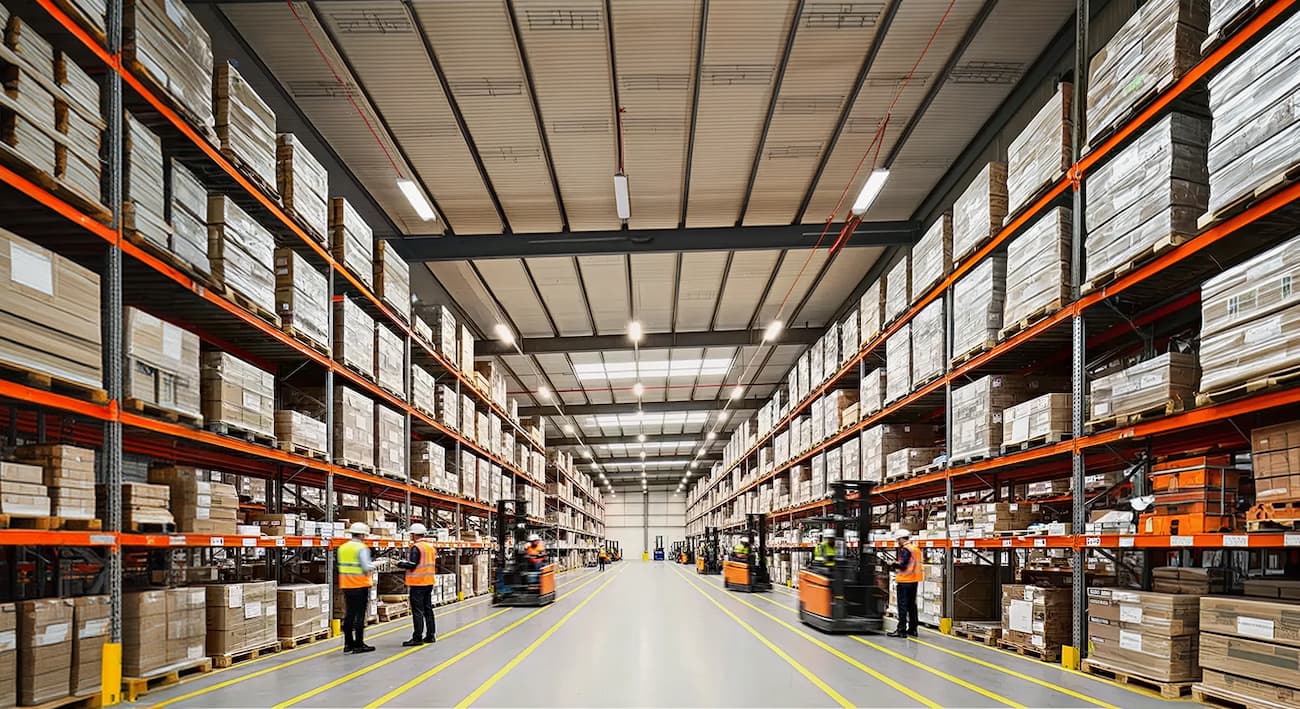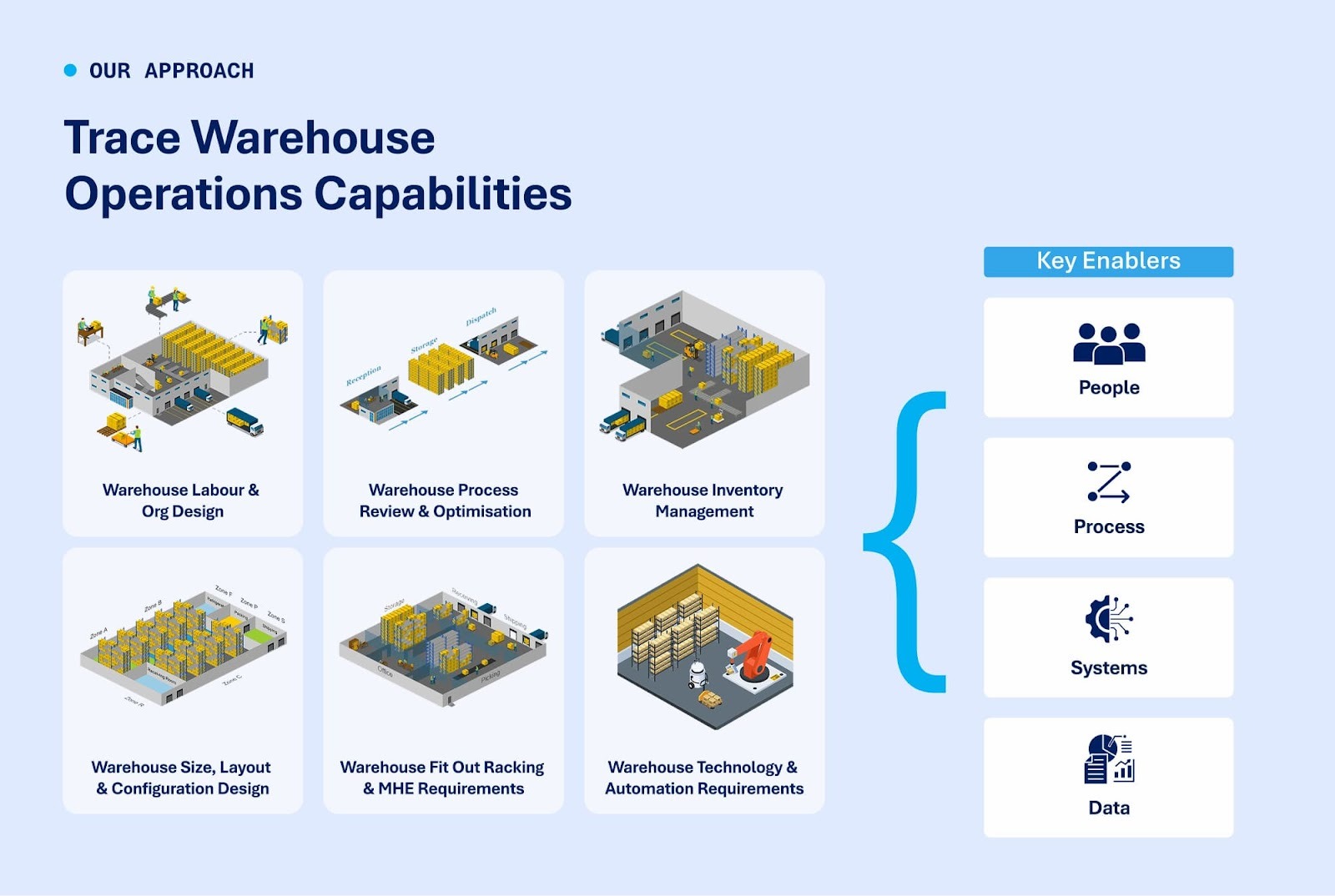Ready to turn insight into action?
We help organisations transform ideas into measurable results with strategies that work in the real world. Let’s talk about how we can solve your most complex supply chain challenges.

In the dynamic world of logistics and supply chain management, transport optimisation has emerged as a critical lever for driving efficiency, reducing costs, and enhancing service levels. For organisations in Australia and New Zealand (ANZ) across retail, manufacturing, healthcare, government, fast-moving consumer goods (FMCG), and technology sectors, the need for robust transport strategies has never been more pressing. As these industries increasingly rely on freight to move goods, the ability to optimise transport operations through strategic reviews and benchmarking analysis can set leading organisations apart from the competition.
This article delves into the importance of transport optimisation, the role of strategic reviews and benchmarking analysis, and how ANZ organisations can leverage these tools to drive tangible improvements in their freight operations. We'll also explore how Trace Consultants, a boutique Australian supply chain advisory firm, can assist organisations on this journey.
The Importance of Transport Optimisation in ANZ
Transport plays a pivotal role in the overall supply chain, often accounting for a significant portion of logistics costs. For organisations across diverse sectors, the ability to optimise transport operations is vital to maintaining competitive pricing, ensuring timely delivery, and meeting customer expectations.
In the retail sector, where margins are tight and customer expectations for fast delivery are high, optimising transport routes, load planning, and carrier selection can significantly impact profitability. For manufacturing organisations, transport efficiency directly affects the cost of goods sold (COGS) and the ability to meet production schedules. In healthcare, efficient transport systems are crucial for ensuring the timely delivery of medical supplies and equipment, impacting patient outcomes and operational efficiency.
Government agencies rely on transport optimisation to ensure the efficient movement of goods and services, particularly in times of crisis or emergency. In the FMCG sector, where speed to market is critical, optimising transport can mean the difference between success and failure in highly competitive markets. Finally, technology companies, which often have complex global supply chains, benefit from transport optimisation to manage the flow of goods, parts, and products across borders.
Strategic Reviews: Laying the Foundation for Transport Optimisation
A strategic review of transport operations is the first step towards achieving optimisation. This process involves a comprehensive assessment of current transport operations, identifying areas of inefficiency, and developing strategies for improvement. Strategic reviews typically cover several key areas:
- Route Optimisation:Route optimisation involves analysing current transport routes to identify inefficiencies and opportunities for improvement. This can include examining the distance travelled, fuel consumption, and the number of stops or delays encountered. By optimising routes, organisations can reduce travel time, lower fuel costs, and improve delivery reliability.
- Carrier Selection and Management:The choice of carriers and the management of carrier relationships is crucial to transport efficiency. A strategic review can help organisations evaluate their current carrier mix, assess performance, and identify opportunities to negotiate better rates or improve service levels. This is particularly important in the ANZ region, where the choice of carriers can significantly impact both cost and service quality.
- Load Planning:Efficient load planning ensures that vehicles are loaded to their optimal capacity, reducing the number of trips required and lowering transport costs. Strategic reviews can identify opportunities to improve load planning through better forecasting, improved scheduling, and the use of technology to maximise vehicle utilisation.
- Technology and Systems:The use of technology in transport optimisation is a growing trend, with tools such as transport management systems (TMS) and GPS tracking playing a key role. A strategic review can assess the effectiveness of existing systems and recommend upgrades or new implementations to enhance transport efficiency.
- Sustainability:As sustainability becomes increasingly important for organisations, transport optimisation must also consider environmental impact. Strategic reviews can identify opportunities to reduce carbon emissions through route optimisation, load planning, and the use of alternative fuels or electric vehicles.
Benchmarking Analysis: Measuring Performance Against Industry Standards
Benchmarking is a powerful tool that allows organisations to measure their transport performance against industry standards or best practices. By conducting a benchmarking analysis, organisations can identify areas where they lag behind competitors or industry leaders and set targets for improvement.
- Cost Benchmarking:One of the most critical aspects of transport optimisation is cost reduction. Benchmarking transport costs against industry averages or best-in-class organisations can help identify inefficiencies and areas for cost savings. This can include comparing fuel costs, labour costs, maintenance expenses, and carrier rates.
- Service Level Benchmarking:Service level benchmarking involves comparing key performance indicators (KPIs) such as on-time delivery rates, order accuracy, and customer satisfaction against industry standards. By understanding how their service levels compare to competitors, organisations can identify opportunities to improve customer satisfaction and loyalty.
- Efficiency Benchmarking:Efficiency benchmarking looks at metrics such as vehicle utilisation, fuel efficiency, and route optimisation. By comparing these metrics against industry standards, organisations can identify opportunities to improve efficiency and reduce waste.
- Sustainability Benchmarking:As organisations increasingly focus on sustainability, benchmarking environmental performance against industry standards is becoming more important. This can include comparing carbon emissions, fuel consumption, and the use of sustainable transport practices.
- Innovation Benchmarking:Benchmarking innovation in transport operations can help organisations stay ahead of industry trends and adopt new technologies or practices that improve efficiency. This can include the adoption of autonomous vehicles, the use of artificial intelligence in route planning, or the implementation of green logistics initiatives.
Sector-Specific Considerations for Transport Optimisation
While the principles of transport optimisation and benchmarking apply across industries, there are sector-specific considerations that organisations in ANZ should take into account.
Retail Sector
In the retail sector, transport optimisation is critical for managing the complexity of last-mile delivery, particularly as e-commerce continues to grow. Retailers must balance the need for fast delivery with the cost of transport, making route optimisation and carrier selection crucial. Additionally, the increasing focus on sustainability means that retailers must consider the environmental impact of their transport operations, potentially adopting electric vehicles or alternative fuels.
Manufacturing Sector
Manufacturers rely on efficient transport operations to ensure the smooth flow of raw materials and finished goods. Transport optimisation in this sector involves managing inbound logistics, coordinating with suppliers, and ensuring that production schedules are met. Manufacturers in ANZ must also consider the impact of transport costs on their overall cost structure, making benchmarking analysis particularly valuable.
Healthcare Sector
In healthcare, transport optimisation is essential for ensuring the timely delivery of medical supplies, equipment, and pharmaceuticals. This sector has unique challenges, including the need for temperature-controlled transport, strict regulatory requirements, and the critical nature of many deliveries. Healthcare organisations must also consider the impact of transport on patient outcomes, making service level benchmarking particularly important.
Government Sector
Government agencies in ANZ are responsible for a wide range of transport operations, from managing public transport systems to coordinating emergency response logistics. Transport optimisation in this sector involves balancing cost efficiency with the need for reliable and responsive services. Strategic reviews can help government agencies identify opportunities to improve transport operations, particularly in areas such as route optimisation and carrier management.
FMCG Sector
The FMCG sector is characterised by high volumes, fast turnaround times, and a need for efficient transport operations to ensure products reach the market quickly. Transport optimisation in this sector involves managing complex supply chains, coordinating with multiple suppliers, and ensuring that products are delivered to retailers on time. Benchmarking analysis can help FMCG companies identify opportunities to reduce costs and improve service levels.
Technology Sector
The technology sector often involves complex global supply chains, with products and components sourced from multiple countries. Transport optimisation in this sector involves managing the flow of goods across borders, coordinating with multiple carriers, and ensuring that products are delivered on time and in good condition. The use of technology, such as TMS and GPS tracking, is particularly important in this sector, making benchmarking analysis a valuable tool for identifying opportunities to improve efficiency.
How Trace Consultants Can Help
Trace Consultants, a leading Australian supply chain advisory firm, specialises in helping organisations across ANZ optimise their transport operations through strategic reviews and benchmarking analysis. With a deep understanding of the unique challenges faced by organisations in retail, manufacturing, healthcare, government, FMCG, and technology sectors, Trace Consultants offers tailored solutions that drive tangible improvements in transport efficiency.
Expertise in Strategic Reviews
Trace Consultants' team of experts conducts comprehensive strategic reviews of transport operations, identifying inefficiencies and developing customised strategies for improvement. By leveraging their industry knowledge and experience, they help organisations optimise routes, improve load planning, and select the right carriers to meet their specific needs.
Benchmarking Analysis for Competitive Advantage
Trace Consultants' benchmarking analysis services provide organisations with valuable insights into their transport performance, allowing them to measure against industry standards and identify areas for improvement. Whether it's cost benchmarking, service level benchmarking, or sustainability benchmarking, Trace Consultants helps organisations set realistic targets and develop strategies to achieve them.
Technology and Innovation
Recognising the importance of technology in transport optimisation, Trace Consultants offers expertise in the selection and implementation of transport management systems, GPS tracking, and other technological solutions. They work closely with organisations to ensure that technology investments align with business goals and deliver measurable results.
Focus on Sustainability
As sustainability becomes increasingly important for ANZ organisations, Trace Consultants helps clients identify opportunities to reduce their environmental impact through transport optimisation. Whether it's adopting alternative fuels, optimising routes to reduce carbon emissions, or implementing green logistics initiatives, Trace Consultants is committed to helping organisations achieve their sustainability goals without compromising on efficiency or cost-effectiveness.
Tailored Solutions for Different Sectors
Trace Consultants understands that transport optimisation is not a one-size-fits-all solution. Each sector has its own unique challenges, and the firm offers tailored strategies to address these specific needs:
Retail Sector Solutions
For the retail sector, Trace Consultants focuses on optimising last-mile delivery, which is often the most challenging and costly aspect of the transport process. By conducting in-depth route optimisation and carrier selection reviews, they help retailers achieve faster delivery times while keeping costs in check. Trace Consultants also works with retailers to implement sustainable transport practices, such as transitioning to electric delivery vehicles or optimising packaging to reduce waste.
Manufacturing Sector Solutions
In the manufacturing sector, Trace Consultants assists organisations in streamlining their inbound and outbound logistics. This includes optimising the flow of raw materials and finished goods, coordinating with suppliers, and ensuring that production schedules are not disrupted. Their strategic reviews often uncover opportunities to reduce transport costs by improving load planning and enhancing collaboration with suppliers and carriers. Additionally, Trace Consultants helps manufacturers integrate advanced technology, such as real-time tracking and predictive analytics, to improve transport efficiency and visibility.
Healthcare Sector Solutions
Given the critical nature of healthcare transport, Trace Consultants offers specialised services to ensure that medical supplies, equipment, and pharmaceuticals are delivered safely and on time. They work with healthcare organisations to optimise temperature-controlled transport, manage regulatory compliance, and improve overall service levels. Their benchmarking analysis helps healthcare providers identify gaps in their transport operations and implement strategies to enhance reliability and efficiency, ultimately contributing to better patient outcomes.
Government Sector Solutions
For government agencies, Trace Consultants provides expertise in managing public sector transport operations, whether it’s public transport systems, emergency response logistics, or the transport of goods and services. Their strategic reviews focus on improving cost efficiency while maintaining high standards of service. Trace Consultants also assists government agencies in adopting best practices from the private sector, ensuring that public services are delivered effectively and efficiently.
FMCG Sector Solutions
In the fast-paced FMCG sector, Trace Consultants helps organisations optimise their transport operations to ensure that products reach the market as quickly and efficiently as possible. This involves managing complex supply chains, coordinating with multiple suppliers, and optimising transport routes to reduce lead times. Trace Consultants’ benchmarking analysis provides FMCG companies with the insights needed to stay competitive, offering strategies to reduce costs, improve service levels, and enhance sustainability.
Technology Sector Solutions
For technology companies, which often deal with global supply chains, Trace Consultants offers solutions that address the challenges of cross-border transport and complex logistics networks. They help technology firms optimise their carrier selection, improve load planning, and integrate advanced transport management systems that provide real-time visibility and control. By leveraging their expertise in innovation and technology, Trace Consultants ensures that tech companies can navigate the complexities of global transport while maintaining efficiency and cost-effectiveness.
Case Studies: Success Stories with Trace Consultants
To illustrate the impact of transport optimisation and benchmarking analysis, let’s explore a few case studies where Trace Consultants has helped ANZ organisations achieve significant improvements in their transport operations.
Case Study 1: Optimising Last-Mile Delivery for a Leading Retailer
A leading Australian retailer faced challenges with its last-mile delivery operations, particularly in urban areas where congestion and high delivery volumes were causing delays and increasing costs. Trace Consultants conducted a strategic review of the retailer’s transport operations, focusing on route optimisation and carrier selection.
The review revealed that the retailer could reduce delivery times by 15% and cut transport costs by 10% by implementing a more efficient routing algorithm and renegotiating contracts with key carriers. Additionally, Trace Consultants recommended the adoption of electric delivery vehicles in metropolitan areas, which not only reduced carbon emissions but also allowed the retailer to qualify for government sustainability incentives.
As a result, the retailer not only improved its delivery performance but also enhanced its reputation as a sustainable business, leading to increased customer loyalty and market share.
Case Study 2: Streamlining Inbound Logistics for a Manufacturing Giant
A major manufacturing company in New Zealand was experiencing high transport costs and frequent delays in receiving raw materials, which was disrupting its production schedules. Trace Consultants conducted a comprehensive benchmarking analysis of the company’s inbound logistics, comparing its performance against industry best practices.
The analysis identified several areas for improvement, including better coordination with suppliers, enhanced load planning, and the adoption of a more advanced transport management system. By implementing these recommendations, the company was able to reduce its inbound transport costs by 20% and improve on-time delivery of raw materials by 25%.
These improvements allowed the company to increase its production efficiency, reduce lead times, and ultimately lower its cost of goods sold, giving it a competitive edge in the market.
Case Study 3: Enhancing Healthcare Logistics for a Government Agency
A government health agency in Australia needed to improve its logistics operations to ensure the timely delivery of medical supplies to hospitals and clinics across the country. The agency faced challenges with temperature-controlled transport, regulatory compliance, and maintaining high service levels in remote areas.
Trace Consultants conducted a strategic review of the agency’s transport operations, focusing on optimising temperature-controlled logistics and improving carrier management. The review revealed that the agency could enhance its service levels by partnering with specialised carriers that offered more reliable temperature-controlled transport options.
Additionally, Trace Consultants recommended the implementation of a real-time tracking system that provided visibility into the transport process, ensuring that medical supplies were delivered on time and in compliance with regulatory requirements. As a result, the agency was able to improve its service levels by 30%, reduce transport costs by 15%, and enhance patient outcomes across the country.
The Future of Transport Optimisation in ANZ
As the business landscape in ANZ continues to evolve, transport optimisation will remain a critical focus for organisations across all sectors. The rise of e-commerce, increasing customer expectations, and the growing importance of sustainability will drive demand for more efficient and environmentally friendly transport solutions.
Technology will play a key role in this evolution, with advancements in artificial intelligence, machine learning, and automation enabling organisations to optimise transport operations in ways that were previously unimaginable. Real-time data analysis, predictive analytics, and autonomous vehicles will revolutionise the way goods are moved, allowing organisations to achieve unprecedented levels of efficiency and service.
At the same time, the need for robust benchmarking analysis will only increase, as organisations strive to stay competitive in a rapidly changing market. By continuously measuring their performance against industry standards and best practices, organisations can identify new opportunities for improvement and ensure that they remain at the forefront of transport optimisation.
Partnering with Trace Consultants for Transport Excellence
Transport optimisation and benchmarking analysis are powerful tools that can transform the efficiency and effectiveness of freight operations for organisations across ANZ. Whether in retail, manufacturing, healthcare, government, FMCG, or technology, the ability to optimise transport operations is essential for maintaining competitiveness, reducing costs, and enhancing service levels.
Trace Consultants, with its deep expertise and tailored approach, is uniquely positioned to help ANZ organisations navigate the complexities of transport optimisation. From strategic reviews to benchmarking analysis and technology implementation, Trace Consultants offers comprehensive solutions that drive real, measurable improvements in transport performance.
As the business environment continues to evolve, partnering with a trusted advisor like Trace Consultants will be key to staying ahead of the competition and achieving long-term success in transport operations. With their guidance, ANZ organisations can unlock the full potential of their transport systems, ensuring that they are not only efficient and cost-effective but also sustainable and future-ready.
Ready to turn insight into action?
We help organisations transform ideas into measurable results with strategies that work in the real world. Let’s talk about how we can solve your most complex supply chain challenges.












